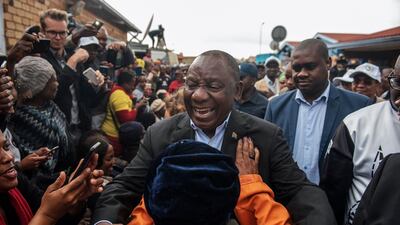South Africans went to the polls this week in the sixth national election, and arguably the most important, since the end of apartheid in 1994.
Life has not improved economically for most people during 25 years of rule by the African National Congress, which has been plagued by accusations of corruption and grave mismanagement of resources.
President Cyril Ramaphosa promised a new dawn for the country after taking office last year when his scandal-ridden predecessor Jacob Zuma resigned in disgrace.
This election is regarded as a referendum on Mr Ramaphosa, who regularly polls higher than any politician since the late president and ANC leader Nelson Mandela.
But it remains to be seen whether the ANC will win a majority large enough to give him the support he needs to stamp out corrupt elements within the party.
The party's challengers are the main opposition Democratic Alliance (DA), and the Economic Freedom Fighters (EFF) party, which has energised millions of voters with the promise of black empowerment and land reform.
With votes counted in more than half of the country's electoral districts on Thursday night, the ANC was lagging behind its performance in 2014.
The DA polled about the same as five years ago and the EFF appeared set for a higher vote share, albeit still below 10 per cent.
“If the EFF grows significantly in this election and the DA fails to grow, Mr Ramaphosa will be confronted not only with resistance for reform from within the ANC but also from the EFF,” said Ralph Mathekga, a prominent political analyst and columnist.
“One way or another, the policy environment will be more contested and require more work to build consensus to implement reforms.”
Under the direction of the populist firebrand Julius Malema, a former leader of the ANC’s youth wing, the EFF has capitalised on growing voter disenchantment and frustration over corruption.
Since its creation in 2013, the EFF has shown it can gain support throughout the country and this election has been no different.
Foreign investors, who Mr Ramaphosa has been courting heavily to rescue state industries including the beleaguered national power utility, have warned that strong gains by the EFF would hurt South Africa’s position in international markets.
The heavy rain and overcast skies in Cape Town on election day were a perfect metaphor for the dire state of the country’s political and economic prospects.
“I believe that Ramaphosa is the only person that can fix our problems,” said Kevin Schroder, a middle-aged IT engineer who also drives for Uber to make ends meet, while queuing to vote in the affluent neighbourhood of Sea Point.
“I don’t have much faith in the ANC but I know Ramaphosa is the right person to lead us out of the mess we are in.”
In shanty towns on the other side of Cape Town's famous Table Mountain, the EFF’s popularity was much more visible as the party’s trademark red berets could be seen on hundreds of supporters around the polling stations.
South Africa's economic data does paints a grim picture. Unemployment is at 27 per cent, the World Bank said. Black South African households earn 20 per cent less on average than white South Africans, the Financial Times reported.
The country’s ability to compete has taken a beating over the last decade. In the World Economic Forum’s Global Competitiveness Report in 2018, South Africa fell from 62nd the previous year to 67th of 140 economies.
The economic troubles are such that many South Africans pine for more political certainty, but with the ANC looking likely to poll less than 60 per cent of the vote for the first time, it is clear that their stranglehold on power is starting to slip.
Mr Ramaphosa would still have a sizeable mandate, largely driven by the force of his own personality, but he will need to contend with pressure from the other two parties as he tries to reform his party from the inside.
“We have been told that Ramaphosa needs time to root out corruption,” said Munyaneza, waiting to vote at a polling station near the centre of Cape Town.
“But I feel like we are running out of time and I hope this election will give him enough power to do what needs to be done.”
Ultimately, South Africa needs foreign investment and capital to repair the state-owned enterprises that have been hollowed out by the corruption of the Zuma years.
It is unclear whether the ANC’s wobbly performance in the election and gradual slip will affect Mr Ramaphosa's strategy of rooting out corruption and improving investor sentiment about South Africa’s economic fundamentals.
But one thing is clear. Africa’s most industrialised country is able to hold free and fair elections but it is still working through the complex issues of inequality from its past.
The question on the minds of voters is whether there will be any short-term economic relief on the back of this election, and the answer remains to be seen.

